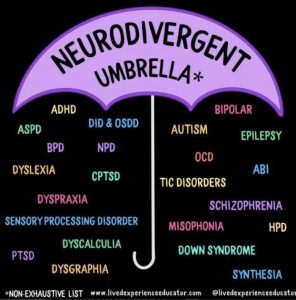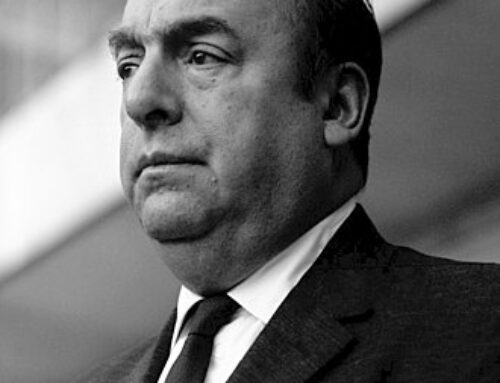The best piece of relationship advice I ever got was to take a sheet of paper and write down all of the attributes that you are looking for in a partner. Honest, funny, curious, bubbly, easy-going, reliable, etc. THEN BECOME THOSE THINGS. You attract what you become.
What you are thinking now is creating your future life. You create your life with your thoughts. Because you are always thinking, you are always creating. What you think about most or focus on the most, is what will appear as your life.
But being happy in a relationship is something you learn. It’s not inherited or given. It’s created by ordinary people with the will and courage to make extraordinary commitments. All you need is persistence and a good map. And picking a partner that is free from mental health issues.
But some can’t always pick their family, for instance, the children of BPD parents have a tough road. Many mental health issues are out there, as shown in the neurodivergent umbrella below, but perhaps the most troubling of all are the ones that defy traditional medication and treatment. There are 14 million adults in the U.S. who are estimated to have borderline personality disorder (BPD). They make up 2 percent of the general population but 20 percent of psychiatric inpatients. Most are women, and they typically turn the ups and downs of everyday life into a roller-coaster ride of moods. In doing so, they don’t just alienate others around them, they subvert their own life trajectory. Explosively reactive, and often struggling to get a grip on themselves, borderlines have difficulty maintaining stable relationships or even holding down a job. Borderlines are interpersonal tornadoes. Chaos and crises, in fact, bring comfort to borderlines. And there is no treatment for Borderlines, although some suggest that dialectical behavior therapy (DBT) may help. Dialectical behavior therapy (DBT) is a type of talk therapy (psychotherapy). It’s based on cognitive behavioral therapy (CBT), but it’s specially adapted for people who experience emotions very intensely. Cognitive behavioral therapy (CBT) is a type of talk therapy that helps people understand how thoughts affect emotions and behaviors. “Dialectical” means combining opposite ideas. DBT focuses on helping people accept the reality of their lives and their behaviors, as well as helping them learn to change their lives, including their unhelpful behaviors. Dialectical behavior therapy (DBT) is especially effective for people who have difficulty managing and regulating their emotions. The main goal of therapists who use dialectical behavior therapy (DBT) is to strike a balance between validation (acceptance) of who you are and your challenges and the benefits of change.
The structure of dialectical behavior therapy can vary some from therapist to therapist, but, in general, DBT involves these four types of sessions:
DBT pre-assessment.
Individual therapy.
Skills training in groups.
Telephone crisis coaching.
DBT pre-assessment
Individual DBT therapy involves weekly sessions with your therapist. Each session lasts about 40 minutes to 60 minutes. To help you learn new skills to replace unhelpful behaviors.
DBT skills aim to help enhance your capabilities in day-to-day life. The four skills your therapist will teach include:
Mindfulness: This is the practice of being fully aware and focused in the present instead of worrying about the past or future.
Distress tolerance: This involves understanding and managing your emotions in difficult or stressful situations without responding with harmful behaviors.
Interpersonal effectiveness: This means understanding how to ask for what you want and need and setting boundaries while maintaining respect for yourself and others.
Emotion regulation: This means understanding, being more aware of and having more control over your emotions.
Dialectical behavior therapy (DBT) usually takes at least six months to a year. However, each person is unique, and mental health conditions are complex. You shouldn’t expect to be completely free of symptoms or no longer have problematic behaviors after one year of DBT. Many therapists believe that the treatment for borderline personality disorder, in particular, can often take several years and others believe it is a lifetime process with no real cure. While there is no specific medication for BPD, certain medications may be prescribed to address specific symptoms or co-occurring conditions. For example, antidepressants, mood stabilizers, or antipsychotic medications might be used.
Chaotic people often have chaotic lives, and I think they intentionally create that as BPD’s. But if you try to have an inner peace and a positive attitude, I think you attract that. Once freed from the chaos, I keep getting asked, “How are you not married?” While the polite Southern response is “Why do you ask?”, I am playing around with other answers:
- Circular answers. Most people should take the hint and let it go.
- ‘Why are you single?’ – Because I’m not married.
- ‘Why aren’t you married?’ – Because I’m single.
- Goddess answer – to inject a little humor
- I have yet to meet anyone worthy
- Flirtatiously go on the offensive, turn the question back on the questioner
(if you use this at all, be very careful about who you use it on)- Are you trying to make an honest man out of me?
- Rebuke
- That’s none of your business.
- That isn’t a polite question.
- Shouldn’t I be handcuffed to a table for this?
- *Silent stare*
- Random
- Oh, bless your heart!
- Because <feign distraction, follow with>
- Ooh, shiny!
- Hey, is that Bridget Bardot?
- What’s that on your shoulder?
- Interspecies mating is forbidden by the Council.
- God has other plans for me
After all, it’s better to be happily single than miserably coupled.
Your job is to love as much as possible every day. Love and adore everything you possibly can today, including yourself, and turn away from the things you don’t love. If you can just do that, your tomorrows will overflow with the untold happiness of everything you love.
For many people, this will come across as counterintuitive. They will wonder how they are supposed to love when they feel utterly unloved. But it can be no other way. In order to receive love, first you must love. In order to receive untold happiness, first you must be happy. Knowing your own personality with the enneagram or with Lumiere is also helpful to knowing your strengths and weaknesses in any relacitonship. The Lover Archetype – Lumière (lumieresolutions.com)









